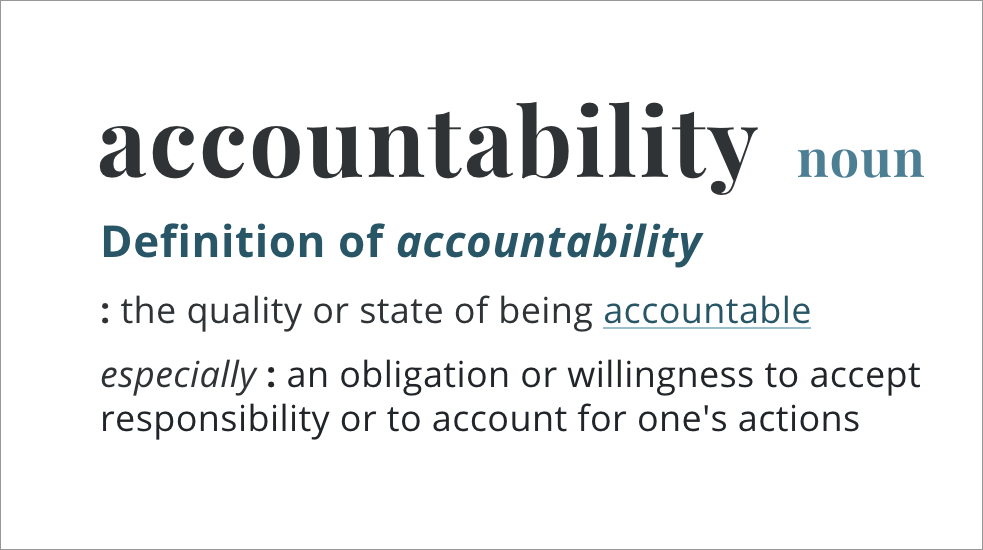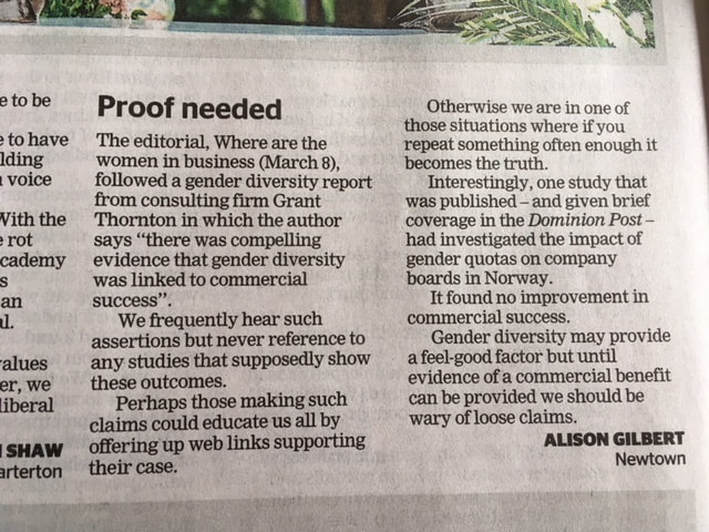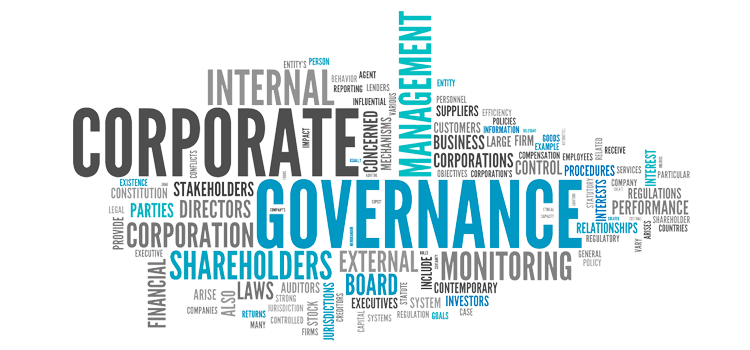|
During June, I spent most of my discretionary time reviewing articles about corporate scandals and failures, as reported in the mainstream media and academic press, and discussed on social media. They made fascinating reading, not only for the summaries, but also the amount of finger-pointing and defensiveness—an indication that accountability was missing in action in most cases. Consider the Carillion, Wirecard and Petrobas cases, all mentioned in a recent Financial Times feature article (paywall, sorry). The discussion concentrated on the accounting and audit professions; the questions being whether they should have detected the problems, and whether ethics should be a consideration. These are good questions, but they sound a little like positioning an ambulance at the bottom of the cliff. Disclosures, in the form of annual reports, audit statements, and various ESG-related reports, are necessary. But they are just that; disclosure reports. And the more complex the reporting and disclosure requirements, the more time management and the board needs to spend preparing and checking reports, to meet expectations. And with greater focus on reporting and compliance, the greater the likelihood that accountability will become discretionary. Accountability is one of four foundational elements of corporate governance. There are two aspects, namely, boards are charged with holding management to account, and they need to provide an account to legitimate stakeholders. (The others are the formulation and approval of corporate purpose and strategy; policymaking; and, monitoring and supervising management, to ensure the company is operated and strategy achieved within prevailing statutory and regulatory boundaries. Together, these four elements comprise the Learning Board Framework, a proposal described in The fish rots from the head, a book written by Bob Garratt, a doyen of corporate governance and board work, circa 1996. The LBF is the single-best approach to board activity that I have come across in my twenty-five years of board and governance practice and research, bar none.) As in life, enduring success in business (meaning, achieving and sustaining high levels of organisational performance) can be attributed to many things. These include, inter alia, a great idea, a clear and coherent strategy, excellent execution, capable and highly-motivated people, forces of nature, timing, effective leadership, luck (yes, luck), and more besides. Yes, success has many sources, even to the point of being idiosyncratic. Failure is different. Even a cursory study of corporate failures reveals several common themes, most of which can be readily traced back to the boardroom:
Almost all of these themes emerge from poor behaviour and a leakage of accountability. Knowing what to do is one thing, knowing how to behave (and behaving) is quite another. Fortunately, help is at hand. Insights from research suggest five underlying behaviours are necessary if boards are to contribute well. These include strategic competence, a sense of purpose, active engagement, collective efficacy and constructive control. If any one of these is absent, the likelihood of the board exerting any meaningful influence or adding any value drops to nought. (If you want more information on this, please get in touch.) One final comment: The role of director is founded on trust—the fiduciary responsibility. And from this flows accountability—in role and in relationship. If boards place a low value on accountability, by not holding management to account for the achievement of operational and strategic goals; rubber-stamping advice from suppliers such as lawyers, accountants and auditors; or, not providing a candid account of performance to shareholders, regulators and other stakeholders, they deserve what comes their way.
2 Comments
News of a new variant of the coronavirus emerged this week. B.1.1.529 (now Omicron, a moniker assigned by the World Health Organization) was first isolated by scientists in South Africa. Already, it has been detected in several neighbouring countries and in the United Kingdom, Belgium, Czechia, Hong Kong, Germany, Australia and Israel. Governments are reportedly “scrambling to protect their citizens from a potential outbreak". These responses are supposedly to protect but also, undoubtedly, to buy time. Given the experiences since the coronavirus disease was first detected and subsequently declared to be a global pandemic, the reactions to the latest variant are hardly surprising. News agencies and social media commentators have been up to their usual antics; newsfeeds are abuzz. Fear is a powerful catalyst, of course. But reliable guidance to indicate whether Omicron is more or less contagious, and more or less virulent, is yet to emerge. For example, the two cases in Australia are asymptomatic and both people are fully vaccinated. A calm response is needed. Another interesting aspect of the current situation is the response to those who first alerted the world to what they had discovered. When virologists in South Africa openly shared the results of their advanced gene sequencing tests, others (especially in so-called advanced economies) were quick to point the finger. They accused several countries in southern Africa of being the source of the outbreak, and ostracised them by banning travel—even from countries with no recorded cases—demonstrating the blame game is alive and well. Effective leaders (boards) do not get caught up in the blame game. They take another path:
Then, having prepared and decided upon a course of action, effective boards remain engaged. They keep their eyes open, scanning for weak signals that might portend danger. If danger strikes, they engage immediately and fully—supporting the executive response but remaining calm at all times. Is your board well-equipped to lead in an event that threatens the company’s prosperity or viability? And what is the likelihood it will oversee an appropriate response? Will it work calmly with the executives as a conjoint team to assess the situation and activate an appropriate response, or will it remain aloof and descend into finger pointing (perhaps because directors are more interested in protecting their personal reputation)? If there is any chance of the latter, consideration should be given to replacing the board with directors who are prepared to take their duties more seriously.
Dave Rennie, a rugby coach from New Zealand, has just been appointed as coach of the Australian national team, the Wallabies. This appointment has raised eyebrows, not only because of the passport the appointee carries, but because of the appointment process. It turns out the Rugby Australia had been speaking with Rennie for six months prior to the appointment being announced. Superficially, this appears to have been a smart move on Rugby Australia's part; a succession planning exemplar. But was it, or was it an act of disloyalty against the incumbent, Michael Cheika? The incumbent only made his intentions clear during rugby's showpiece, the Rugby World Cup, vowing to resign if the Wallabies did not win the William Webb Ellis Cup. Cheika and Raelene Castle, chief executive of Rugby Australia, were hardly the best of buddies, for sure. But when does strength in leadership (Castle has form) cross the line, becoming bullying? This case exposes an interesting dilemma for boards of directors. When does the board's duty of loyalty to the incumbent chief executive cease? Is it reasonable, for example, to publicly support the incumbent while also scheming in the shadows to replace him or her? If the board finds itself in a position of lacking confidence in the chief executive (regardless of the reason), it owes a moral duty to both the chief executive and the organisation for which it is responsible to act both swiftly and with integrity. Rugby Australia appears to have done neither. While Castle probably operated within the law (she is on record as saying that formal contract negotiations did not take place until after the Rugby World Cup), the moral high ground was forfeited long ago. And that, sadly, places both Castle and the Rugby Australia in a rather awkward position.
The 2018 edition of the Global Peter Drucker Forum was convened in Vienna, Austria this week. This post summarises insights from the second day (click here for insights from Day 1). I didn't take as many notes on the second day, preferring instead to sit, listen and dwell on what was said. (I also missed a couple of sessions, one to finalise my own preparations to speak; another to spend time privately with a two inspirational thinkers.) However, there were, for me, two speakers that really stamped their mark on the day, as follows: Hermann Hauser, director of Amadeus Capital Partners and chair of the European Innovation Council, delivered a strong message, arguing that humanity is on the cusp of an inflection point (moving beyond evolution to design thinking) that has the potential to 'change everything' in the reasonably near future. He identified four significant disrupters:
The implications of these disrupters are, frankly, rather daunting. Synthetic biology offers the prospect of defeating disease, but at what cost? Quantum computing has the potential to render electronic security systems useless. One doesn't have to be a rocket scientist to realise the massive implications for commerce, banking and warfare. Researchers and technologists are committed to bringing these capabilities to market. But at what cost to humanity? The ethical implications are not insignificant. Recognising this, Hauser suggested that the state has an important role to play, to ensure appropriate regulatory boundaries and safeguards are established. But it must act quickly, before the genie gets out. Martin Wolf, chief economics editor of the Financial Times, spoke passionately about the role of the state; in his view, the single-most important institution in human history. I first heard Wolf speak a few years ago. He left a strong impression on me then, and did so again as he spoke. Addressing the question of how states can 'work better', Wolf named several important roles that the state 'must' fulfil par excellence:
Such roles need to be implemented with aplomb. Failure to do so will inevitably lead to anarchy, in Wolf's view.
I arrived in London yesterday, ahead of what promises to be an interesting week. Formal commitments include delivery of the CBiS seminar in Coventry; planning for a future board research initiative; and a miscellany of meetings in which corporate governance, effective board practice and this recent article will be discussed. Two recent events, Carillion's fall from grace, and the now-public machinations at the Institute of Directors (which have resulted in the resignations of the chairman, Lady Barbara Judge, and deputy, Ken Olisa), are likely to invigorate discussions. Already, I've been asked to comment publicly on the Institute's troubles. The problems at the Institute of Directors in particular are troubling. They strike at the heart of what many say is wrong with boards and corporate governance; the Institute becoming a laughing stock in some quarters. The Institute's effectiveness as a professional body is contingent on it being the epitome of good board practice. The IoD chief executive, Stephen Martin, said on Friday that the resignations are a victory for good governance. They are not. Rather, they are an indictment of poor governance. Sadly, the Carillion and Institute of Directors cases are not unique. They are but two of many examples of poor practice that reinforce perceptions that boards are not effective. The ancient Chinese saying (more correctly, curse) seems especially applicable just now. If trust and confidence is to be restored, the power games, hubris and ineptitude apparent in some boardrooms need to be rectified. Flawed understandings of what corporate governance is and how it should be practiced also need to be corrected, especially the misguided belief that any particular board structure or composition is a reliable predictor of firm performance (the following letter highlights the conventional wisdom problem). The scene is set for some fascinating discussions this week. I'll let you know how I get on.
I had the distinct privilege of attending the 9th Global Peter Drucker Forum in Vienna this week. Approximately 500 people attended the two day forum held in Aula der Wissenschften (Hall of Sciences). The programme included fifteen plenary sessions and a parallel session (four tracks). The very full programme was run to time; a Swiss watch operated with Germanic efficiency, in the birthplace of Drucker. Many global authorities in strategy, innovation, entrepreneurship and related addressed those in attendance (and many more utilising the live feed option). Presenters included Richard Straub; Angelica Kohlmann; Jenny Darroch; Hal Gregersen; Roger L. Martin; Anil K. Gupta; Bill Fischer; Rita Gunther McGrath; Sidney Finkelstein; Tammy Erickson and Carlotta Perez, and more. The forum produced many insights; the following commentary merely a portion lifted from my 28 pages of notes: Richard Straub, President of the Peter Drucker Society, set the scene by noting that Drucker, a man genuinely interested in the bigger 'why' questions, maintained a strong focus on business performance. He avoided cookie-cutter 'solutions', a reflection perhaps that such solutions don't work within the dynamic and social context of modern organisations. Straub went on to say that management is most accurately conceived as a liberal art [to be understood holistically], not as a social science that can be reduced to constituent elements. Lisa Hershman, DeNovo Group, posed the question, "How do we generate growth and ensure more people participate in it?" This was not a veiled call to embrace left-leaning socialist ideals and anti-business practices, but rather a clarion call for 'inclusive capitalism'. (I've been using an equivalent term in speeches in the last couple of years: 'capitalism with a heart'.) Hershman noted that around half of the young people in the United States say they prefer socialism over capitalism. This, she said, is a clear indication that something is wrong. Business leaders have become too focussed on themselves and shareholders, to the exclusion of others. This collapse of confidence needs to be addressed by business leaders. If it is not, companies are likely to find it increasingly difficult to recruit motivated and capable young people. Why? Because they are not interested in working for poor leaders who they do not believe in, much less aspire to. Jenny Darroch, Dean, US Peter Drucker School, explored the essence of an effective business and societal ecosystem. She described five key interests (characteristics), namely, a functioning society, where all can participate; recognition that management is a liberal art, not a simplistic of formulaic process; that self-management is important, because neither the state nor business 'owes' people work; that performance [actually] matters; and, 'transdisciplinarity' (i.e., looking beyond the immediate context, sector, role, team) is crucial. These comments set a solid platform for what was to follow. Hal Gregersen, MIT Leadership Center, spoke on the important topics of community and communication. He asserted that isolation is the number one enemy of innovation. The world is far too complex for one person acting alone to be effective. Leaders that sit in their office and wait for input are far less effective that the best leaders, who actively seek to reduce (to zero, if they can) barriers in pursuit of the best possible information to understand current reality and what might be possible, so as to inform effective decision-making. The best leaders also encourage dissent, inviting people to both ask and respond to uncomfortable questions, because they want to discover what is wrong and what can be improved. Asking the right questions and, importantly, getting authentic responses (but not necessarily simple answers) depends on being in the right place (read: with staff, customers, in the market) and inviting people to challenge the status quo. Roger L. Martin, Rotman School of Management, built on Gregersen's comments by observing the prevalence of certitude (that sense of 'being right' common amongst leaders especially so-caleld alpha males and queen bees. Rather than stridently asserting preferences and blindly applying models (which are often wrong because they are simplifications of reality), Martin recommended that leaders reframe their statements as follows. "I'm modelling the world, but my model is incomplete. What can you add?" Great leaders pursue multiple models, combining and building to make something better (note, a better solution not a compromise). According to Martin, this always leads to better outcomes. Several speakers addressed the question of whether growth is actually an imperative. No speaker spoke against growth or its optionality. Rather than almost assumed the answer is 'yes', and moved quickly to consider how growth might be achieved. Anil Gupta, for example, noted that China is responsible for 27 per cent of global carbon dioxide emissions, and India 6.6 per cent. He opined that if India is to grow out of poverty then growth must be coloured—green—to avoid killing the very people it seeks to lift out of poverty. The recommended route is to industrialise, but to do so with smart technology to avoid the avoid the environmental mistakes (and their negative consequences) experienced by China and others. Martin Reeves, Boston Consulting Group, added that while growth is necessary, it is beomcing increasingly elusive. As a consequence, companies operating in developed nations need to change their focus. Rather than growth at any cost, companies need to discover and pursue the right type of growth. Invoking Aristotle, Reeves observed that companies that embrace both economic and social goals (oikonomic companies) do better in the long term. Specific recommendations (boards and directors, take note) include:
Allyson Stewart-Allen, International Marketing Partners, and Julia Hobshawn, Editorial Intelligence, sounded a warning, arguing that the unfettered pursuit of connectedness—networking in pursuit prosperity, health and whatever else—has a dark side: info-besity. An over-reliance on social media networks have the unwanted effect of starving people of what actually matters: deep socail connections. People are human beings, not human doings, and social connections matter much more than activity masquerading as social connectedness. Pointedly, sustainable relationships and business sustainability is dependent on people, and their interaction and curiosity not social media. I found myself thinking, "Isn't this obvious?". Maybe so, but a quick glance around the room suggested maybe not: almost everyone within eyesight has their eyes down, using a smart device as the speakers continued. Joseph Ogutu, Safaricon, and Haiyang Wang, China–India Institute, provided insights from a developing nation perspective. Whereas many Westerners perceive social disparity to be limited in developing nations, the reality is somewhat different. Disparity between people groups in developing nations is actually higher than in developed nations. Further, many African nations have de-industrialised since gaining independence. The speakers made strong calls for developing nations to embrace manufacturing as a means of achieving the economic growth needed to lift millions out of abject poverty. While many entrepreneurs and investors stand ready to fund initiatives, local communities need to pursue partnerships, lest they suffer new forms of dependency. Steve Blank, entrepreneur, and Bill Fischer, IMD, observed that the pressures faced by chief executives in the twenty-first century are different from those in the twentieth century. Then, if CEOs met the expectations of their boards (however expressed) and responded to competitive pressures, then they were reasonably safe in their role. But things have become more complex since the turn of the century. Two additional forces have emerged, namely, activist investors (read: corporate raiders) and disruption. If CEOs are to respond well to this new reality, they need to become comfortable with ambiguity and chaos. Helpfully, Blank and Fischer offered four additional suggestions to enhance leadership effectiveness in the twenty-first century:
Rita Gunther McGrath, Columbia Business School, introduced the forum to a tool to help leaders and investors undertsnad the future growth prospects of any given company. The 'ImaginationPremium' is, simply, a ratio of a company's market capitalisation and value from operations. If the imagination premium is high (but not too high to become hype—Tesla), the sustainable growth is likely. Conversely, low ratios suggest growth is unlikely. The extreme case of a ratio less than 1 suggests shrinkage. On strategy, innovation and disruption. Several speakers outlined cases to demonstrate that a coherent, longer-term strategy is actually more, not less, important in times of change and disruption. They noted that well-formed strategy, not detailed plans (often, incorrectly, called strategic plans), helps lift the gaze of both leaders and staff above immediate technologies and disruptions, to focus on purpose, the customer and longer-term goals. General observations. Standing back a little, the investment to attend was well-spent. To be amidst giants, and chat with some of them (all were accessible and none pretentious) was a privilege and an honour—I learnt a lot. The only disappointment from my perspective concerned the speaking roster. While about 20–25 per cent of the speakers were world-class (both content and delivery), a similar percentage were disappointing. The lesser speakers either repeated what others had said, or their presentations were thinly-veiled sales pitches. Upwards of ten attendees, including some speakers, voiced similar concerns in private. My hope for future editions is that the organisers review speaker candidates more closely, to ensure a consistently high standard. Stepping beyond that, the general calibre of the forum (organisation, content, delivery) was very high. My intention is to return to Vienna in November 2018, for the the 10th edition of the Global Peter Drucker Forum. Hopefully, I'll be able to share the platform, offering some insights relevant to the theme.
Unlike previous editions of the EIASM corporate governance workshop that I've attended, the 2017 keynote session was delivered by three luminaries, not one. W. Lee Howell, Bob Garratt and Tom Donaldson—men of considerable gravitas in their respective fields—led the keynote session together. Each spoke separately, and a panel discussion followed. Lee Howell opened the session with a telling quote: "Being right too soon is socially irresponsible" (Heinlein). This quote, a reference to impetuous decision-making on the basis of seemingly-strong (and sometimes quite weak) evidence, notes a common weakness amongst strong leaders, more so in complex environments. Though not named explicitly, Howell's opening comments carried strong implications for those advocating diversity in boardrooms and other structural 'remedies'. Howell followed by describing the efforts of the World Economic Forum (the Davos meeting in particular) to improve decision-making quality in the face of rapid change, technological advancements, globalisation and high levels of cultural and social complexity. He said that WEF is intentionally pursuing four priorities to achieve the desired outcome—these being
Howell's comments set the scene. Though provocative in the minds of some, the assertion that business is not independent from government and civil society was generally accepted across the largely academic audience. The implications for boards are not insignificant. Bob Garratt spoke next. He opened with a strong critique—that corporate governance as we have known it is dead. Though aimed more so at the practitioner, regulator and director institute communities, this opening gambit had the effect of capturing the attention of everyone in the room. The implication, of course, is that if the understanding of corporate governance is somehow wrong, then much current research may actually be futile—a point that Garratt and I have discussed and are in strong agreement. Whereas corporate governance was conceived as a term to describe the effective work of the board of directors as it seeks to drive business performance, Garratt noted the demise of the term, to now one closely associated with the task of compliance and the associated activity box-ticking (though this is generally denied by directors when they are interviewed). In an oblique reference to his new book, Garratt asserted that the rot must be stopped. Continuing, he noted four international trends that boards need to respond to if the value creation mandate that they can and should be pursuing is to be realised—specifically,
The third speaker was Tom Donaldson. He mounted a challenge to boards and directors, arguing that they need to embrace 'second order values thinking' as a means of moving beyond short-termism, hubris and self-centred decision-making. The critical difference between first order and second order values is that first order values tend to be non-intrinsic, whereas second order values are intrinsic. Interestingly, most management theorists think in terms of first order values. Donaldson closed with a strong challenge. Noting that boards of directors are uniquely positioned to act on the basis of intrinsic values, openly and without double-speak, Donaldson called on boards to embrace an inclusivity, meaning to act beyond pure and unadulterated self-interest. A strong call, one Peter Drucker and Henry Mintzberg would both have endorsed. Together, these three speakers' comments had the effect of shining much-needed light on the ills of normative board practices (read: corporate governance). Helpfully though, the speakers did not stop their criticism of board practice. They suggested possible solutions, and supported them with strong arguments. Directors and directors' institutes could do far worse than to investigate these ideas and test their relevance and applicability.
The storied fall from grace of Wells Fargo continues to produce fodder for both informed discussion and speculation. And rightly so. Much can be learned from this case, of a once-proud bank that started believing its own press, and then breaching ethical and legal boundaries. To maintain a fictitious facade undermines the confidence that many private citizens place in banks. The first, and most important learning is that when trust is eroded—regardless of whether through illegal and immoral actions or more simply ineptitude—consequences typically follow. In Wells Fargo's case they have, well mostly. The bank's share price and reputation have both taken a hit: mistrust being a heavy burden. Now, the results of an independent investigation into the fake accounts scandal have been published. The report is comprehensive (it is nearly 100 pages long). The stated goal of the investigation was to identify the root causes of "sales practice failures", so that "these issues can never be repeated and to rebuild the trust customers place in the bank". So, what was discovered? Expectedly, operational failings were uncovered. The report lays much of the blame on the shoulders of the then chief executive, Mr Stumpf. This is appropriate because the chief executive is the person who is normally responsible for operational performance, in accordance with both approved strategy and policy. Changes to personnel and practice have been made. What is perhaps surprising however, is what is not reported. The board does not appear to have looked in the mirror. Yes, the roles of chairman and chief executive have been separated and allocated to two different people—but what of the board's engagement in effective oversight of management? The board of directors knew of the sales practice failures as early as 2014. Remedial actions were (supposedly) taken in 2015, and management reported these were working. But who checked? That the board knew about the problem and remedial actions were supposedly taken is clear. What is far less clear is whether the board satisfied itself that the actions had in fact been taken and/or that the desired effects had been achieved. Sadly this is not uncommon. That the board trusted management, and blindly so it would seem, does not excuse the board from the consequences of the scandal that followed. The board-commissioned independent review has shone the light brightly on management. Problems have been identified and actions taken. This is good. Now, one significant step remains: the board should have a good long look in the mirror.
Just over twelve months ago (6 January 2016 to be exact), I wrote this muse, a reflection on both the state of corporate governance and the usage of the term. At that time, confusion over the use of the term 'corporate governance' was common, and the profession of director was shadowed somewhat by several high profile failures and missteps. The blog post seemed to hit a nerve, triggering tens of thousands of page views and searches within Musings; many hundreds of comments, questions, debates and challenges (including some from people who took personal offence that the questions were even asked); and, speaking requests from around the world. That many people were asking whether corporate governance had hit troubled waters and were searching for answers to improve board effectiveness was reassuring. That was twelve months ago. How much progress has been made since? At the macro level, seismic geo-political decisions; the rise of populism and the diversity agenda; and, risks of many types, especially terrorism and cyber-risk have altered the landscape. Also, new governance codes and regulations have been introduced to provide boundaries and guidance to boards. Yet amongst the changing landscape something has remained remarkably constant: the list of corporate failures or significant missteps emanating, seemingly, from the boardroom continues to grow unabated. Wynyard Group and Wells Fargo are two recent additions; there are many others. Sadly, companies and their boards continue to fail despite good practice recommendations in the form of governance codes and (supposedly) increasing levels of awareness of what constitutes good practice. This is a serious problem: it suggests that, despite the best efforts of many, progress has been limited. Clearly, ideas and recommendations are not in short supply, but what of their efficacy—do they address root causes or only the symptoms? And what of the behaviours and motivations of directors themselves, and the board's commitment to value creation (cf. value protection or, worse still, reputation protection)? That the business landscape is and will continue to be both complex and ever-changing is axiomatic. If progress is to be made, shareholders need to see tangible results (a reasonable expectation, don't you think?), for which the board is responsible. If the board is to provide effective steerage and guidance, it needs to be discerning, pursuing good governance practices over spurious recommendations that address symptoms or populist ideals. How might this be achieved? An important priority for boards embarking on this journey towards effectiveness and good governance is to reach agreement on terminology, culture, the purpose of the company and the board's role in achieving the agreed purpose. If agreement can be reached, at least then the board will have a solid foundation upon which to assess options, make strategic decisions and, ultimately, pursue performance.
Corporate governance—the concept and the practice—has been the subject of much debate over the past two or three decades, especially as researchers, shareholders and the public have sought to make sense of the extent and meaning of the term and the appropriate role of the board. A cacophony of ideas and understandings have now pervaded our academies and directors' institutes (including that the scope of corporate governance extends well beyond the boardroom to include the whole of the organisation). As a concequence, the appropriate role of the board is not clear. Is it one of oversight and control, or is the pursuit of performance more important? The answer to this question is dependent on one other: What exactly is corporate governance? Many directors have become confused about these questions and, as a result, the appropriate role and contribution of the board. Thankfully, a straightforward answer is at hand. The term 'corporate governance' was coined just 56 years ago by Richard Eells, an academic. He used the term to describe "the structure and functioning of the corporate polity" (the board of directors). Sir Adrian Cadbury added that corporate governance is "the means by which companies are directed and controlled". In other words, corporate governance is an overarching term to encapsulate what boards (should) do as corporate goals are pursued. Corporate governance frameworks (such as those proposed by Tricker and Garratt) provide the underlying detail: they describe how the board should steer and guide the company it is responsible for governing. Directors expecting to make effective contributions in 2017 and beyond would be well-advised to consider this what–how distinction very carefully: a common (and agreed) understanding is crucial if the board is to work harmoniously and decision-making is to be effective.
|
SearchMusingsThoughts on corporate governance, strategy and boardcraft; our place in the world; and other topics that catch my attention. Categories
All
Archives
May 2024
|
|
Dr. Peter Crow, CMInstD
|
© Copyright 2001-2024 | Terms of use & privacy
|











